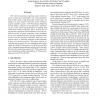Free Online Productivity Tools
i2Speak
i2Symbol
i2OCR
iTex2Img
iWeb2Print
iWeb2Shot
i2Type
iPdf2Split
iPdf2Merge
i2Bopomofo
i2Arabic
i2Style
i2Image
i2PDF
iLatex2Rtf
Sci2ools
131
click to vote
INFOCOM
2005
IEEE
2005
IEEE
Achieving faster access to satellite link bandwidth
TCP with Van Jacobson congestion control (VJCC) is known to have poor performance over large bandwidthdelay product paths. Long delay paths, in particular, can display very poor behavior with VJCC slowly probing to acquire available capacity. TCP Performance Enhancing Proxies (PEPs) constitute one mechanism for ameliorating poor VJCC end-to-end performance by splitting TCP connections around a long-delay link or network and using alternate congestion control dynamics across the troublesome portion. Previous congestion control techniques for use over satellite links have typically constituted either tweaks to the Van Jacobson algorithms, Vegas-style congestion control, or disabling congestion control altogether in favor of a manual send-rate. This paper analyzes results from measurements of a new congestion control mechanism, the eXplicit Control protocol or XCP, between PEPs with a simulated geosynchronous satellite link in the path. We show that connections using an XCP PEP acquire t...
Communications | Congestion Control | Congestion Control Dynamics | INFOCOM 2005 | Jacobson Congestion Control |
Related Content
| Added | 25 Jun 2010 |
| Updated | 25 Jun 2010 |
| Type | Conference |
| Year | 2005 |
| Where | INFOCOM |
| Authors | A. Kapoor, Aaron Falk, Theodore Faber, Y. Pryadkin |
Comments (0)

